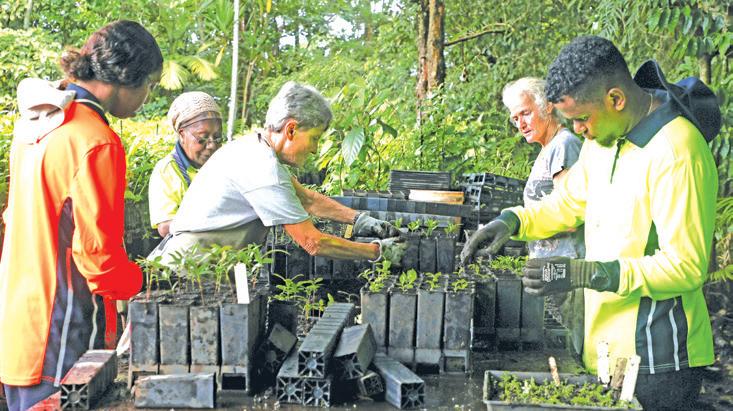
3 minute read
2023 Season outlook
Australian Sugar Milling Council

Advertisement
AS the first of 19 Queensland sugar factories begin steam trials this week, sugar manufacturers throughout the State are looking forward to a safe, prosperous and incident-free season.
The Australian Sugar Milling Council believes that the return to El Nino conditions is helpful and should limit the weather-induced disruptions to harvesting and milling; that was the case during the past two years.
The starting estimate for the
Queensland sugar cane crop is 30.55 million tonnes, up by about 400,000 tonnes on the pre-season 2022 forecast but down by about 700,000 tonnes on what was eventually processed.
In 2023, sugar production is estimated at between 4.0 and 4.5 million tonnes, while more than 850,000MW/h’s of renewable electricity will be generated at mills. Two sugar factories in the Northern sugarcane growing regions of the State will commence operations in the week commencing 22 May, with the rest of the factories starting from early June onwards.
The Australian Sugar Milling Council CEO, Rachele Sheard, noted that last year’s extended harvesting season had significantly compressed the annual shutdown period when sugar factories undertake most of their maintenance and capital activity, putting pressure on costs and schedules. Sugar manufacturers across the state have invested over $200 million of capital and maintenance, including new technology introduced into sugar factories over the past five months.
“Sugar manufacturers and growers have a shared ambition for a successful harvesting and sugar manufacturing season to take full advantage of the dry start to harvesting conditions and the record high sugar prices that are available for this year’s production,” Ms Sheard said.
More than 16,000 workers are directly engaged in the sugar industry during the harvesting and sugar production season, and regional communities will experience a solid boost to their economic activity on the back of a successful season.
Another positive for the industry is that the very profitable price outlook that prevails for the Australian industry is expected to bring a halt to the steady decline in the area planted to sugarcane experienced in the past five seasons. This is important for all the industry, particularly for sugar factories, enabling them to maximise throughput, sugar production, and returns.
Johnstone Region Landcare Group has secured $1.08

native rainforest trees for future regional revegetation and carbon credit projects.
One of Johnstone Region Landcare’s project outcomes is the increase of riparian vegetation on creeks and riverbanks adjacent to farms in the Johnstone River catchment. The project will restore four hectares of riverbank and creeks at priority sites in the Johnstone River catchment, reducing sediment and nutrients flowing into waterways.
Maria Girgenti
FOLLOWING on from the successful delivery of a Reef Assist project between 2020-2022, the Johnstone Region Landcare Group has secured a further $1.08 million in funding for two years under the Queensland Government’s Reef Assist 2.0 program through the Queensland Reef Water Quality Program.
In late 2022, the Queensland Government doubled their initial commitment to $20 million for the second round of Reef Assist projects, with several being funded in the Wet Tropics region.
Over the next two years, Johnstone Region Landcare’s Reef Assist 2.0 project will provide employment, training, and empowerment for 27 locals (focusing on youth and Indigenous people) in conservation and land management practices. It will support the group in propagating over 100,000
The revegetation activities within this project aim to reduce erosion and water pollution in the Great Barrier Reef Lagoon. The Reef 2050 Water Quality Improvement Plan (Reef 2050 WQIP) water quality targets list the reduction of dissolved inorganic nitrogen (DIN) as a high priority and the reduction of fine sediment, particulate phosphorous and nitrogen as a moderate priority in the Johnstone River catchment.
Project Manager Adrian Hogg stated, “training and employment in this project significantly contributes to local capacity building and expertise in tropical riverbank revegetation projects. We hope to encourage landholders in the region and younger generations to be more involved in these revegetation activities.”
Adrian specifically highlighted the value of the employment component in the Reef Assist program’s delivery outcomes, stating, “Our project offers a unique opportunity for local young people who are participating in
Reef Assist 2.0 program
JobFind’s Transition to Work Program to have meaningful and paid on-thejob experience, working outdoors, and restoring the natural environment.”
The Australian Government’s Transition to Work program is a specialist pre-employment service for youth aged 15 - 24. Program providers deliver intensive, personalised support to assist local young school leavers develop practical skills to obtain future employment, including apprenticeships and/or training/education.
The intense focus on employment in the first iteration of the Reef Assist program meant that Johnstone Region Landcare could get off to a flying start in 2023, having a project team in place that completed their Certificate III in Conservation and Ecosystem Management in the past year, and working under the continued leadership of previous supervisors Adrian Hogg and Katherine Fischer.
“The majority of the project’s funding will be spent on local employment, and at local businesses meaning it is also injecting a much-needed economic boost to the Cassowary Coast region.”

“Overall, we see this as a big win for our local environment, water quality, bank stabilisation and native wildlife, for young people, employment, and the regional economy.”
Johnstone Region Landcare wants to expand its volunteer base to assist with native tree propagation in our nursery at 2 Stitt Street, Innisfail. We welcome volunteers on Tuesdays and Wednesdays from 9.00 am until 12.00 pm, and all are welcome.










